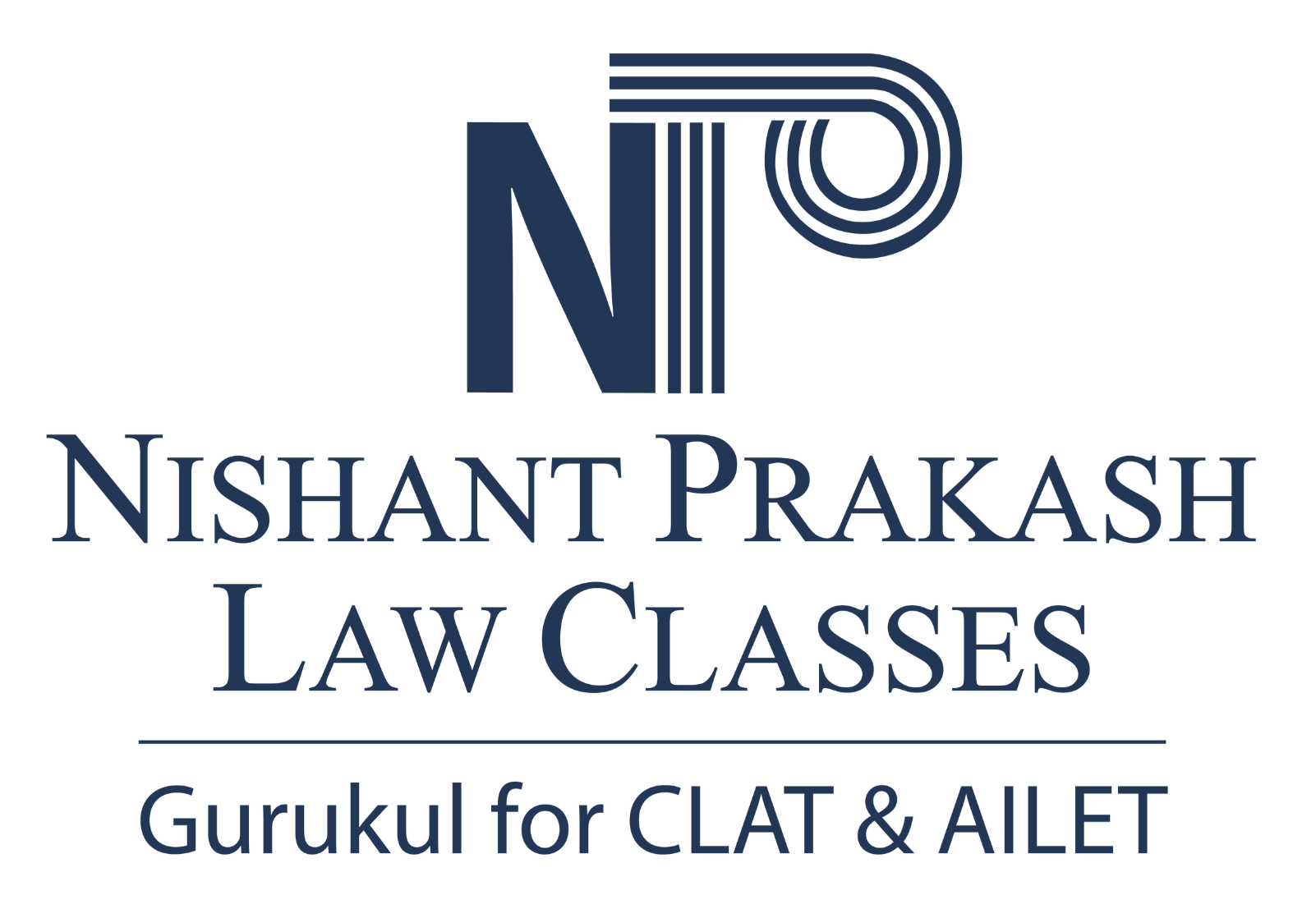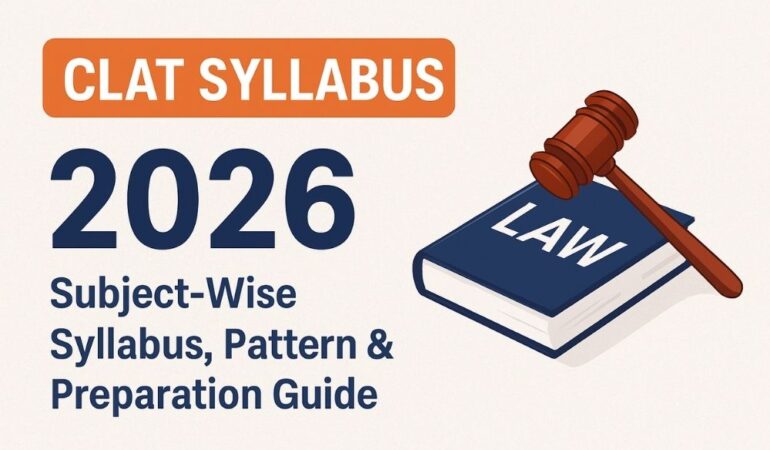Preparing for the law entrance exam can feel overwhelming, especially when the CLAT syllabus is vast and multidimensional. Whether you are starting your CLAT preparation from scratch or refining your strategy, having a clear understanding of the syllabus is the first step. At Nishant Prakash Law Classes (NPLC), recognized as one of the best CLAT coaching in Delhi, we help students break down the syllabus into manageable sections and approach it with clarity and focus.
This guide covers the subject-wise syllabus, weightage, preparation tips, and how CLAT online coaching and offline mentorship can make your journey smoother.
What is CLAT?
The Common Law Admission Test (CLAT) is a national-level law entrance exam conducted for admission to undergraduate (UG) and postgraduate (PG) law programs at National Law Universities (NLUs) and other participating institutions.
- Conducting Body: Consortium of NLUs
- Mode of Exam: Offline (pen and paper)
- Type of Questions: Multiple-choice, passage-based questions
- Courses Covered: BA LLB (Hons), BBA LLB, LLM
For UG aspirants, the CLAT syllabus mainly tests reading, reasoning, and legal aptitude, while PG aspirants focus on law subjects.
CLAT Exam Pattern (UG)
Before diving into the syllabus, here’s a quick look at the CLAT exam pattern:
- Total Marks: 120
- Total Questions: 120
- Duration: 2 hours
- Marking Scheme: +1 for correct answer, -0.25 for wrong answer
Section-Wise Question Distribution
- English Language: 22–26 questions (~20%)
- Current Affairs including GK: 28–32 questions (~25%)
- Legal Reasoning: 28–32 questions (~25%)
- Logical Reasoning: 22–26 questions (~20%)
- Quantitative Techniques: 10–14 questions (~10%)
CLAT Syllabus 2026 (UG)
Let’s break down the CLAT syllabus section-wise for better clarity.
1. English Language
This section tests comprehension skills and grammar through passage-based questions.
Key Topics:
- Reading Comprehension
- Vocabulary (Synonyms, Antonyms)
- Grammar (Sentence Correction, Active/Passive Voice)
- Figures of Speech
- Inference and Tone of Passage
Preparation Tip: Read editorials from newspapers like The Hindu or The Indian Express. It helps in CLAT English and also Current Affairs.
2. Current Affairs & General Knowledge
One of the most scoring yet unpredictable sections in CLAT.
Key Topics:
- National & International Current Affairs
- Important Judgments and Legal Developments
- Awards & Honours
- Books & Authors
- Science & Technology Updates
- Sports & Events
Preparation Tip: Daily newspaper reading and monthly GK magazines are a must. If you’re taking CLAT coaching online, ensure the institute provides daily current affairs updates.
3. Legal Reasoning
The most important section for CLAT aspirants.
Key Topics:
- Legal Principles in Law of Torts, Contracts, Constitutional Law, and Criminal Law
- Legal Maxims
- Case Laws and Judgments
- Passage-based questions applying legal reasoning
Preparation Tip: Focus on understanding concepts, not rote learning. Good CLAT coaching simplifies legal reasoning with mock tests and previous year papers.
4. Logical Reasoning
This section checks analytical ability and logical thinking.
Key Topics:
- Critical Reasoning
- Argument Strengthening/Weakening
- Cause & Effect
- Statement & Assumptions
- Puzzle-based reasoning
Preparation Tip: Solve at least 10 reasoning questions daily. Many CLAT coaching institutes provide reasoning practice sets that mirror the exam format.
5. Quantitative Techniques
This is based on elementary mathematics (Class 10 level).
Key Topics:
- Arithmetic (Percentage, Profit & Loss, Ratio, Averages)
- Algebra Basics
- Mensuration
- Probability
- Data Interpretation (Tables, Graphs, Charts)
Preparation Tip: Since the weightage is small, focus on speed and accuracy. Attempt this section only after building confidence in the main scoring areas.
CLAT PG Syllabus 2026
For postgraduate aspirants, the syllabus focuses on law subjects.
Key Areas:
- Constitutional Law
- Jurisprudence
- Administrative Law
- Family Law
- Law of Contract
- Criminal Law
- Property Law
- Public International Law
- Company Law
- Environmental Law
- Labour & Industrial Law
Questions are passage-based, testing legal knowledge, interpretation, and application.
How to Prepare for the CLAT Syllabus Effectively
- Make a Timetable – Divide subjects weekly and stick to it.
- Focus on Reading – Build a reading habit to tackle comprehension-heavy questions.
- Daily GK Practice – Current affairs can make or break your score.
- Mock Tests & PYQs – Attempt at least one mock test every week.
- Coaching Support – If you’re struggling with self-study, consider joining CLAT coaching near me or opt for CLAT online coaching for flexible learning.
Best Way to Approach CLAT Coaching
Students often wonder whether to choose offline or online coaching. Both have advantages.
-
Offline CLAT Coaching Near Me:
- Direct interaction with teachers
- Peer competition
- Doubt-solving in person
-
CLAT Online Coaching:
- Flexibility of time
- Access to recorded lectures
- Mock tests and digital resources
If you are in a metro city, finding CLAT coaching near me is easy. But if not, CLAT online coaching is equally effective with the right institute.
CLAT Exam Pattern at a Glance
- Total Questions: 120
- Duration: 2 hours
- Marking: +1 for correct, -0.25 for incorrect
- Mode: Offline, pen-paper test
How to Approach CLAT Preparation
Here’s where strategy matters. A smart study plan saves time and maximizes results.
Step-by-Step Approach:
- Start Early: Give yourself at least a year to master concepts and practice.
- Daily Reading Habit: Develop Comprehension and Awareness.
- Section-Wise Strategy: Devote time based on your strengths and weaknesses.
- Mock Tests: Analyze mistakes and improve accuracy.
- Coaching Support: Guidance from experts at institutes like NPLC can accelerate your preparation.
Benefits of CLAT Coaching
Many aspirants search for CLAT coaching near me or choose CLAT online coaching. Both approaches work, but structured coaching has its advantages:
- Expert mentors simplify complex topics
- Regular AILET & CLAT mock tests simulate the exam environment
- Time management skills are sharpened
- Doubts are cleared instantly with personalized attention
At NPLC, our small batch sizes ensure every student gets tailored mentorship.
Why Choose NPLC for CLAT Coaching?
- Proven track record of toppers in CLAT and AILET
- Limited batch size for personalized attention
- Both offline and CLAT online coaching options are available
- Focus on daily practice, monthly current affairs updates, and detailed mock analysis
For students searching for the best CLAT coaching in Delhi, NPLC offers a balanced mix of discipline, mentorship, and results.
Final Thoughts
The CLAT syllabus is comprehensive but absolutely manageable with the right strategy and support. Break it down into subjects, revise consistently, and practice mock tests regularly. Whether you prefer self-study or guided learning through CLAT coaching, what matters is consistency and clarity in preparation.
If you are aiming to crack CLAT 2026 or beyond, start today. Understand the syllabus, commit to a plan, and take help from the right mentors.



